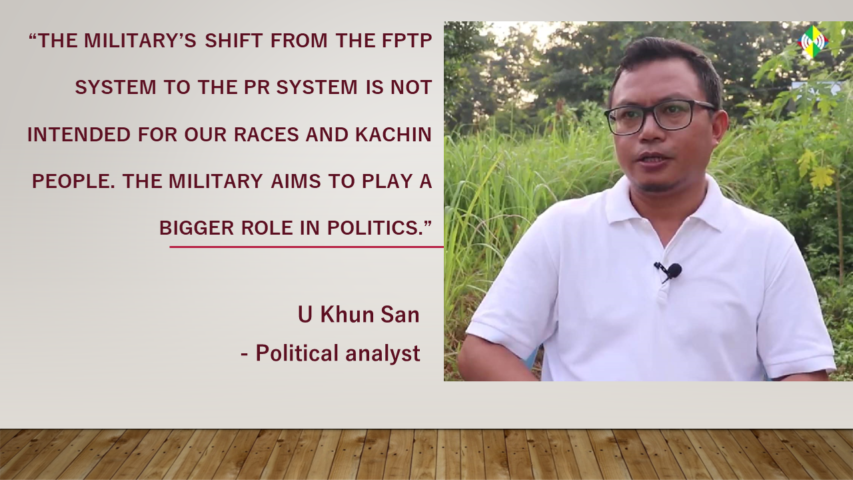An interview with U Khun San, the political analyst about the extension of districts by the military council.
May 12, 2022
On April 30th, the military council announced the formation of an additional 46 districts across the country. Two new districts, namely Tanai and Chiphwe, are added to the list in Kachin State.
Tanai and Chiphwe Townships are included in Myitkyina District. The Kachin News Group (KNG) interviewed U Khun San, the political analyst from Myitkyina, about the reason for the extension of districts and the impacts on the people in Kachin State.
Q: The military council formed the new districts across the country. Two new districts were formed in Kachin State. May I know your view on the formation of two new districts?
A: The shift from the First Past the Post (FPTP) system to the Proportional Representation (PR) system aims to change the election system in Myanmar. Because the designation of constituencies in the election in Myanmar is crucial. They are playing politics by separating the constituencies.
Q: Can you explain the PR system?
A: The PR system is the Proportional Representation. The FPTP is the Fact Past the Post system. The party which secures the majority vote wins the election. Under the PR system, the party can go to the parliament based on their winning percentage in the respective constituencies. For instance, a party wins ten seats in Waingmaw and 20 seats in Myitkyina. The collection of all votes can help the party go to the parliament. For instance, there are 100 constituencies in Kachin State. Although a party can’t secure the majority seats, it can go to the parliament by collecting the winning seats in Waingmaw, Bhamo, Myitkyina and Mohnyin. That is the difference. Under the FPTP system, the party which secures 50 seats can win a victory over the party who secures 30 or 40 seats.
Q: Do you think that the military extends the new districts as it is not in a position to secure seats like the National League for Democracy (NLD), and ethnic areas in Myanmar are wider.
A: The military has a regretful thing. Under the FPTP system, the party may secure the majority seats. The military wants to participate in party politics. Take a look at four elections in Myanmar, the party which partially secured the seats didn’t have a chance to play a role. The military council mainly wants to get a position in parliamentary politics. The military seized power as it had no chance to participate in parliamentary politics. The military’s effort to shift from the FPTP system to the PR system is not intended for our races and Kachin people. The military aims to play a bigger role in politics.
Because there are a lot of things to be changed to get genuine federal rights through the election. For instance, the military doesn’t change things like the lack of sharing of power to the State government and giving the rights to the State parliament. This is the division of power. For the genuine federal system, there must be the division of power between the Union and the states. Soldiers in Swanparabwan cast their advance votes when the election was drawing near. Such cases affect the political rights of our indogenious people. The military wants to make a shift from the FPTP system to the PR system without the discussion on the voting by soldiers and guests, the issuance of NRC cards and the division of power between the Union and the states. Without the federal rights of the ethnic. We can clearly see the fact that the shift aims to avoid the NLD’s victory by securing the majority seats in the election and enable the military to have a chance to do more activities in politics.
Q: The ethnic political parties have no expectations as they have no chance to run for the seats in the election across the country?
A: Both the FPTP system and the PR system have weaknesses. The weak point of the FPTP is that the party which secured 51 seats wins the victory over the party which secured 49 seats. Under the PR system, the party can go to the parliament by collecting 10 or 30 winning seats. This is the advantage of the PR system. For instance, the PR system has the ways of how to designate the constituencies. There are no expectations for ethnic parties. That’s why, we cannot decide whether it is the FPTP system or the PR system through a superficial view. The unclear point is whether the PR system will be exercised in the whole country or both the FPTP system and the PR system. Most of the world’s countries use a combination of the FPTP system and the PR system. There are different PR systems. We don’t support it as the military attempts to avoid situations like the NLD’s landslide victories in 2015 and 2020 elections, the military and its allied political parties are trying to enter the parliament. It is found that our ethnic people have no political rights.
Sent by the KNG.

